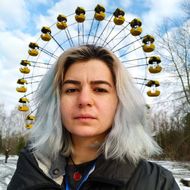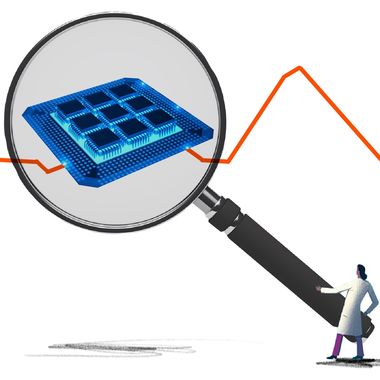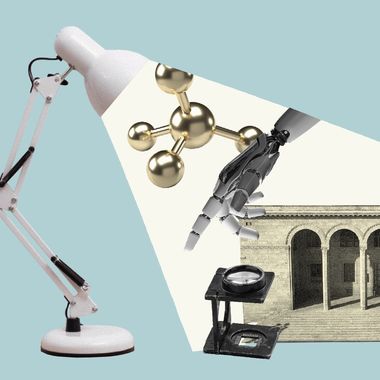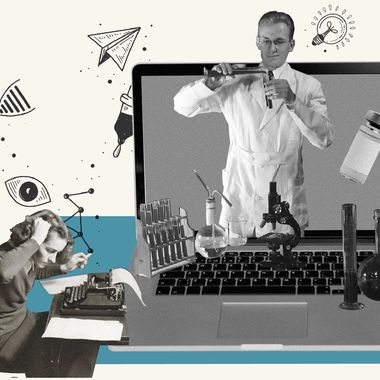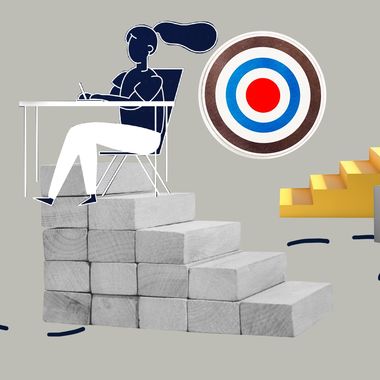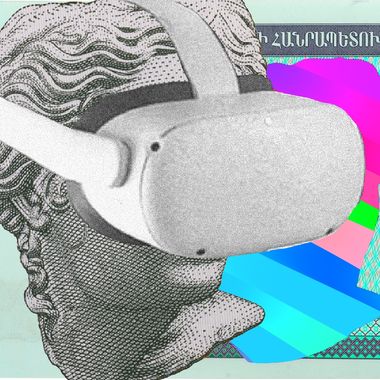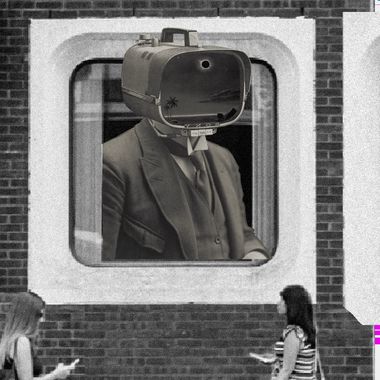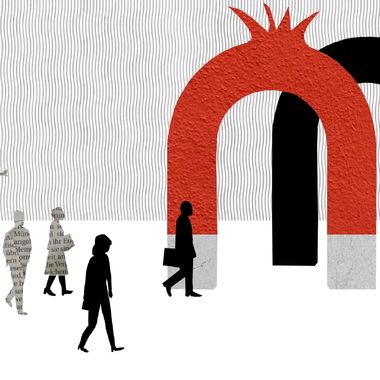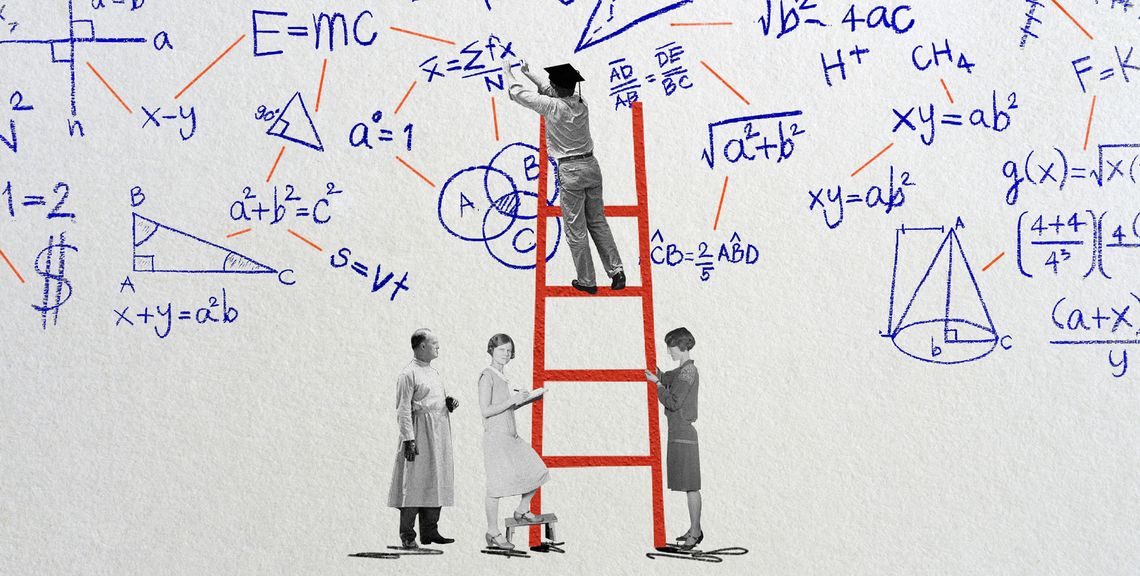
Illustration by Armine Shahbazyan.
In this demon-haunted world that we inhabit by virtue of being human, science may be all that stands between us and the enveloping darkness.
Carl Sagan
I live in a place which presents itself as a “genius town” or a “city of science.” When I arrived nearly half a year ago, locals proudly shared that the first artificial kidney, Bluetooth, inkjet printer and many other inventions were developed here, in Lund, Sweden. The street I live on is called Laboratory Street, while my workplace is on Professor's Street, and there is a whole science village in the north of the city. I have started my doctorate in Biological Physics, so most of my working day is filled with doing science, teaching science to undergraduate students, discussing science and learning about the science that other people do. Even the people I meet outside of academia are appreciative and excited to learn about research.
You might be wondering why I am “advertising” a small Swedish town, but this is not meant to be an ad. I am a very regular PhD student of Armenian background, who genuinely wanted (and tried) to do fundamental science in Armenia. I graduated from the Physics faculty of Yerevan State University (YSU), then obtained my Master’s degree in Germany, after which I decided to try my luck in Armenia. Despite meeting many amazing scientists during my education and later employment as a research assistant in Armenia, it was obvious to me that it would be nearly impossible to reach my goals.
I won’t reinvent the wheel, saying that doing life sciences in Armenia is extremely difficult, especially experimental work, as state-of-the-art laboratories are very expensive to equip and operate. While this is a difficult issue to solve for a small country such as Armenia, some problems on the surface are easier to spot, such as low salaries, base financing and the attitudes of the government and the general public.
Renowned scientist and communicator Neil deGrasse Tyson once said that adult scientists are like children who never grew up. Recalling the joy I feel every time I solve a problem or the many hours spent fiddling with a new, fancy experimental setup, yes, I definitely feel like a child with a new toy, which never gets boring. However, as adult human beings, scientists also need to address their basic human needs, like everyone else.
Let’s talk numbers, to be clearer: the average monthly salary in Armenia in 2020 was 189,716 AMD, with scientists earning 100,000 AMD ($200/month, $2400/year), just over half of the average. Yes, solving the questions of life and the universe is extremely fun, but there cannot be any talk about passion or excitement when one’s salary is below the “survival threshold.” And money is not the sole issue. It is also about how the government and the general public treat science and scientists in Armenia. When I have voiced many times that it is nearly impossible to find a good position with a good salary with my specialization and skills, I consistently receive answers like, “Why even bother? You need to adapt; you can be either a scientist and poor, or switch to programming, like everybody else does.”
While I enjoy coding and respect those in the IT field, I and many others didn’t spend many years on education and training, just to abandon it for a different direction. What if I want to be a scientist and receive an appropriate salary? What if I want to be a scientist and feel valued, instead of being frowned upon as someone wasting their youth and chances of a better life? The obvious choice was finding a position somewhere else, with the hope that one day I might be able to do science in my home country, as well.
“Why even bother,” they ask. I am concerned about the country’s current situation, especially after the dire economic and social effects of the 2020 Artsakh War and the COVID-19 pandemic. This is not just about me complaining about funding; the problem is a government and a society which have actively neglected science, resulting in an aging system which is slowly dying.
Yes, I am concerned. So, I was very happy when I learned about “Gituzh”: an initiative by industry representatives to draw attention to the importance of science as the way towards economic and strategic development. Gituzh’s goals are the following:
-
To persuade the government to increase public funding for science development programs currently available to the science committee;
-
To fix the commitment for bold and competitive public allocations for research and development (R&D) in the law or by other equivalent mechanisms;
-
To kickstart strategy development based on such commitment.
The initiative has gathered like-minded people—not only in industry, but also scientists working in Armenia and abroad. I decided to talk to both members and supporters of Gituzh, whose sectors range from business to fundamental science. In doing so, I found that all had at least two things in common: a passion for science and an understanding of the crucial importance of scientific development for Armenia. Gituzh emphasizes the importance of fundamental and applied science by showing that issues in science do not only concern scientists, but the economy and the future of Armenia's development as a whole.
Tigran Shahverdyan, co-founder of Robomart and one of the initiators of Gituzh, discussed the direct influence of science on the economy. While Shahverdyan studied space engineering and has experience in academia, he chose to continue his career in industry. As a representative in the field of high technologies—which was also chosen as a strategic direction by the latest government of Armenia—he points out the technological stagnation Armenian high tech faces or has already faced, despite IT being one of the best-paid sectors in Armenia.
If most people decided to switch their backgrounds in Physics, Computer Science and other STEM fields to programming, we would start losing potential intellectual property. Nobody can blame people for doing this; the huge gap in salaries definitely plays its part, so the choice is between science and financial stability. We can’t make scientific breakthroughs when we’re concerned about affording utilities, can we? During my interviews, two main points were brought up: the importance of modern, cutting-edge science for education and the creation of knowledge and intellectual property in academia.
Many of us who graduated from universities in Armenia have probably felt that the knowledge we received is mostly behind on updates and recent findings. Sure, the laws of physics do not change over time, but the knowledge accessible to us is constantly updated, proven or rejected. While I received a good background in physics and mathematics at YSU, my knowledge about modern experimental methods was very limited. Modern achievements and scientific articles were not a main part of our education; we didn’t learn how to write scientific reports, or what the scientific method or journal impact factor is. I had the privilege to be introduced to reading and presenting scientific articles by my bachelor thesis supervisor, which introduced me to modern research in protein biophysics.
Hrant Khachatrian, the founder of YerevaNN and a machine learning scientist based in Armenia, also had a similar experience during his education at YSU. He puts an emphasis on the ability of students to get acquainted with modern research by reading scientific papers. Though not part of the official curriculum, his supervisor assigned reading and presenting research papers, which is invaluable for understanding modern science. It is not enough to understand what other scientists are doing; it is also important to have lecturers who are actively involved in research, as education in science is not just about learning the known information, but also obtaining the necessary skill set of scientific methodology and problem-solving skills to address new, unsolved issues. YerevaNN is a great example of promoting modern scientific research and offering an alternative to industry. In Dr. Khachatrian’s words, student interest is very high, however, most of them lack these skills due to the gaps in university education in Armenia.
Evidently, only a small percentage of students are going to end up becoming researchers; however, that small percentage is responsible for educating not only the next generation of scientists, but also teachers, engineers, doctors, technicians and other professionals. Hence, research-based education is key for not only scientific, but also economic, development. Most of my interviewees agree. On the other hand, most scientists are choosing to switch to industry, where the skills obtained doing research are critical to understanding frontier technologies, exploring new topics, applying scientific methods and creating intellectual property.
To summarize, we can generalize that the problems of underpayment and lack of modern structure and opportunities to conduct state-of-the-art research in Armenia has led many scientists to either change their career path or seek a scientific career elsewhere. For the few scientists who decide to stay in Armenia, they can still produce competitive results, thanks to their incredible dedication and efforts, but they have the constant disadvantage of financial instability and inaccessibility of necessary resources.
On the other hand, if necessary accommodations are provided, there are many researchers of Armenian origin who would be willing to return to Armenia, or at least benefit the nation’s scientific development in other ways. Zhirayr Avetisyan, researcher in Mathematical Physics and Visiting Assistant Professor at UC Santa Barbara, is one such scientist. In Dr. Avetisyan’s words, it is important to create opportunities, especially for early career researchers, as it becomes more difficult to relocate in advanced career stages. As a theoretician, he indicates that theoretical science requires less investment than experimental research. He finds appropriate funding and competitive salaries to be absolutely vital.
“A theoretician only needs a furnished office, good internet connection and accessibility to international journals. There should be means to travel to conferences, invite colleagues and employ select PhD students—also from abroad. A competitive salary is also a must: successful scientists are in high demand also in other countries and institutions. It is even harder when the researcher has a family: the apprehension that the scientist should work with a low salary due to enthusiasm is totally wrong,” he explains.
While every single technology, device or medication we use nowadays is a direct result of commercializing the findings of applied science, fundamental science is often underlooked by both lawmakers and the general public. Fundamental science is, quite simply, research that aims to answer general questions about how things work, whereas applied science addresses specific questions to solve practical problems. Dr. Avetisyan explains the difference with a comparison: a living organism requires the function of all vital organs. Fundamental science is like an internal organ, which is not externally visible, but if that organ is removed, the body would cease to function.
The connection, which many government officials refuse to acknowledge, is rather simple: fundamental science is vital for applied sciences to develop and stay up-to-date, and applied sciences are directly used in engineering and industry. The first and obvious connection is the fact that the knowledge created within fundamental science is the cornerstone for the development of new, practical tools and approaches. Furthermore, it is not just the knowledge itself which plays an important role, but also the knowledge transfer and education. Scientists who devote their life to fundamental research and teach at universities are educating hundreds of specialists, who later become engineers, applied scientists or school teachers. Thus, even when fundamental research does not directly find practical applications, the expertise, knowledge, research skills and passion of those scientists are transferred to their students, who can apply those gains in different fields, which can directly influence the economy.
The constant flow between fundamental and applied sciences is also emphasized by another member of the Gituzh initiative, Aram Jivanyan. A cryptography advisor and entrepreneur, Dr. Jivanyan recalls his research experience during his PhD days. His scientific group, which had networks in South Korea, was introduced to a problem and the solution was of interest to Samsung. In his words, their motivation was not only solving technologically challenging problems, but also to promote Samsung opening a branch in Armenia, which could have been a big milestone and technological investment. While Samsung investigated the opportunity of opening a branch in Armenia, they did not pursue it. From an investment standpoint, they would have needed a few hundred employees, which was not feasible.
Drawing the attention of big technological corporations can be vital for the Armenian economy, and most of the interviewees believe that this can be done only by having a competent and top quality workforce, which in turn, can only be achieved with top quality science and education at all possible levels.
Gituzh supporter Gevorg Yeghikyan considers himself the pessimist of the group. With an undergraduate degree in architecture, he later received a PhD in Urban Science at the Scuola Normale Superiore di Pisa in Italy. With a smile, he says that his pessimism keeps the balance, as he thinks that it is too early to talk about further steps and the current focus should be the preservation of existing scientific traditions. He also agrees that the first and short-term goal should be appropriate base funding, combined with inventorization. Inventorization should include identifying scientists and scientific branches which are currently active and can offer ground for further development.
The second and medium-term goal should be the integration of scientists in current scientific trends, meaning that even with competent research skills, scientists might lack soft skills, such as grant writing and finding appropriate funding. If senior scientists do not have the management skills, research might fall behind. Finally, the long-term goal is the development and execution of strategic plans, including identifying and promoting target areas and branches of science, which are determined to be the most crucial for further development.
What Dr. Yeghikyan calls “pessimistic,” I see as more of a down-to-earth approach, with the emphasis on the bureaucracy involved in achieving stable scientific development. In his words, we need researchers who are enthusiastic, charismatic, but also good bureaucrats, because the issues of science management should not be neglected, either.
There are often arguments, both on social media or by the government, on why people leave when “they can stay and benefit their own country.” I hope I have delineated how poor funding, low salaries and the lack of opportunities and perspectives have resulted in either the emigration of many early career researchers or a drastic career change. A direct consequence of this is the decreasing number of researchers in Armenia, with a very small percentage of younger people. We mainly lack the bridge between theoretical research and the applied sciences, of which the latter requires more investment and cooperation between the government, academia and industry to develop and execute research and production in the most strategically relevant fields. Science management, inventorization and the evaluation of strategic areas are yet more challenges.
Nonetheless, if problems are correctly defined, solutions can be found. There can be a number of ways and opinions on how to solve these challenges; for example, a drastic increase in base funding, competitive grant projects, more research positions and well-paid PhD fellowships. However, I’d like to emphasize that, even though appropriate funding is an absolute necessity, it is insufficient in itself to achieve any long-term goal of strategic development. Scientific cooperation between researchers within the country and abroad, acknowledgement of scientific achievements and career promotions are crucial, as well. Science management, systematic changes and the prioritization of strategic branches and topics are also challenging, but still solvable. In this world, where quantum computers are being developed and full genomes sequenced, those solutions should be possible.
Gituzh members and supporters are ready to assist with their experience, skills and networks, to raise awareness, facilitate strategic discussions and find and implement solutions. I genuinely admire this group, not only for their scientific achievements and success, but also for their enthusiastic efforts to bring forth necessary changes in Armenia. As their slogan states, “Powerful Science, Strong State.”
Creative Tech
A Physicist’s Guide to Science Research in Armenia
By Tatev Mkrtumyan
This article is not about the past, the golden decades when science flourished in Armenia. It’s a guide on what can be accomplished in the present and into the future through the lens of one visionary, Dr. Mushegh Rafayelyan.
The Myth of “National” Science
By Gagik Tovmasian
The current state and future direction of science in Armenia has been discussed on various platforms recently. Gagik Tovmasian writes about the need to elevate the status of national institutes and willingness to open up to the world.
Gitak: Bridging Students With Supervisors for Science Research
By Tatev Mkrtumyan
With the absence of qualified academic supervisors and challenges with the quality of student research, there was a need to develop a platform where students and supervisors could meet remotely.
Edu2work: A Navigation Tool Bridging the Gap Between Education and Labor Markets
By Ruzanna Baldryan
How an AI-powered platform that analyzes thousands of online job postings from a wide variety of commercial websites to provide insights into the labor market can make data-driven decisions come to life.
Legal Institutions for an Emerging Technology Economy
By Henry Nikogosyan
On the path to becoming a serious player in the global tech sector, Armenia needs to foster an environment that allows technology companies to achieve their business goals, which includes legal institutions to resolve complex disputes.
An Armenian Painter’s Foray Into the Cryptic World of NFTs
By Lilly Torosyan
Masha Keryan collaborated with Armenian AR/VR game development app Arloopa on an experimental project to showcase some of her artwork digitally. The result was their first-ever AR exhibition of NFT pieces and VR Tilt Brush sculptures.
High Tech, Low Culture: Armenian Creative Industries and New Media
By Vahram Akimyan
This is not a cyberpunk essay about a dystopian future, but rather an attempt to take a pragmatic look at creative industries and the landscape of digital culture in Armenia.
Digital Pomegranate and Distrikt: Connecting Tech to Sustainable Living in Gyumri
By Hovsep Markarian
Digital Pomegranate, already into its eighth year, has played an active role in shifting the image of Gyumri from a city of poverty and tragedy to a city with a viable future. Its new project, Distrikt, promises to be the first SDG compatible community in the world.
Podcast
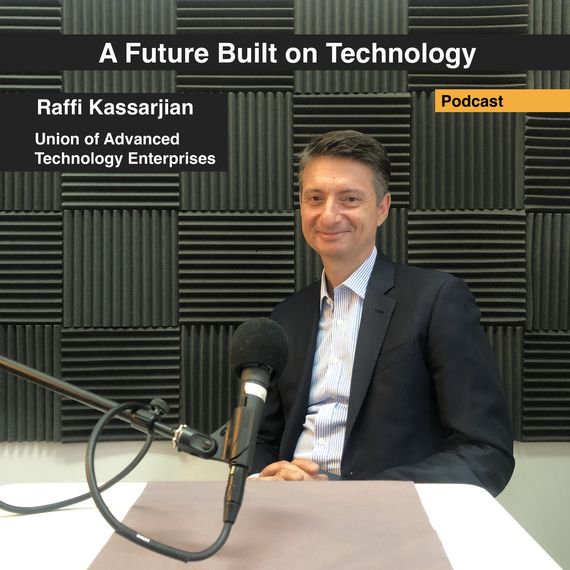
Armenia’s tech sector is the fastest growing branch of Armenia’s economy. In post-war Armenia, expectations are even greater for the sector. Raffi Kassarjian, the Executive Director of the Union of Advanced Technology Enterprises (UATE) talks about the challenges and potential, the role of the Diaspora and more.

